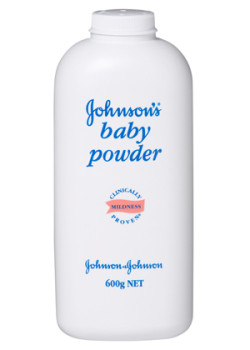Top Class Actions’s website and social media posts use affiliate links. If you make a purchase using such links, we may receive a commission, but it will not result in any additional charges to you. Please review our Affiliate Link Disclosure for more information.

This Johnson’s Baby Powder lawsuit has been filed in an Illinois federal court by plaintiff Lynne C., who alleges that the Johnson’s Baby Powder product caused her to develop ovarian cancer.
According to the baby powder cancer lawsuit, Lynne started using Johnson’s Baby Powder in 1992 for feminine hygiene purposes and was diagnosed with ovarian cancer 20 years later, on May 14, 2012.
Similar to other baby powder cancer lawsuits alleging this claim, Lynne accuses Johnson & Johnson of knowing the risk pertaining to their talcum powder products, but failed to inform its customers of this correlation, and did not mention it on the products’ labels.
Lynne states in her baby powder cancer lawsuit that Johnson & Johnson had the responsibility to protect her and other consumers from all side effects of their talcum powder products, because these consumers are relying on the accuracy of the given information.
Furthermore, Lynne insists that she never would have used the product if she had known about the possibility of ovarian cancer. Lynne is seeking $350,000 in damages for the charges of negligence, misrepresentation, concealing information, and false advertising, among other product liability allegations.
Lynne is one of many in a population of women who developed ovarian cancer allegedly as a result of applying Johnson & Johnson’s Baby Powder and Shower-to-Shower powder products to the genital area, which has been a traditional feminine hygiene technique for decades.
While some have questioned this ovarian cancer connection as being presumptuous, other healthcare organizations have advocated it and encourage other doctors to spread awareness about it.
For example, the Cancer Prevention Coalition has been repeatedly asking the federal government to force Johnson & Johnson to update its talcum powder product labels. These product labels have not been updated since 1994, even though the products have been undergoing scientific testing since the 1970s, with results indicating that there was a slightly higher risk of ovarian cancer development.
Despite the results of past and recent studies, other organizations remain doubtful of a possible correlation due to how low the likelihood is. Even with speculation surrounding the medical community, baby powder lawsuits alleging this injury have been popping up across the country.
This first talcum powder ovarian cancer lawsuit was filed in October 2013 by South Dakota plaintiff Deane B., who alleged she developed the devastating condition from using Johnson’s Baby Powder. Deane won the baby powder cancer lawsuit, which encouraged other women to file baby powder cancer lawsuits against Johnson & Johnson, alleging similar injuries from the product.
Overview of Baby Powder Ovarian Cancer Lawsuit
While experts are not entirely sure how ovarian cancer is caused by Johnson & Johnson’s talcum powder products, many agree on a strong likelihood. Studies show that once women apply the powder to their genital areas, the talc particles can travel through the genital area and into the fallopian tubes and into the ovaries.
These particles can sit in the body for years, according to some experts. It has been estimated that it would take eight years for one particle of talc to dissolve in the lungs, if inhaled, and has been compared to causing consequences similar to the asbestos-induced cancer, mesothelioma.
According to the American Cancer Society, it was estimated in 2014 that 21,980 ovarian cancer cases will be diagnosed, and that 14,270 women will die from this condition. Experts state that women who use talcum powder in their genital area are 24 percent more likely to develop ovarian cancer.
While consumers have been oblivious of this association until recently, leading to the growing litigation movement against Johnson & Johnson. These baby powder cancer lawsuits have been filed against the company for failing to warn them about the danger of ovarian cancer.
Do YOU have a legal claim? Fill out the form on this page now for a free, immediate, and confidential case evaluation. The attorneys who work with Top Class Actions will contact you if you qualify to let you know if an individual lawsuit or class action lawsuit is best for you. [In general, baby powder cancer lawsuits are filed individually by each plaintiff and are not class actions.] Hurry — statutes of limitations may apply.
ATTORNEY ADVERTISING
Top Class Actions is a Proud Member of the American Bar Association
LEGAL INFORMATION IS NOT LEGAL ADVICE
Top Class Actions Legal Statement
©2008 – 2024 Top Class Actions® LLC
Various Trademarks held by their respective owners
This website is not intended for viewing or usage by European Union citizens.
Get Help – It’s Free
Join a Free Baby Powder Cancer Class Action Lawsuit Investigation
If you used Johnson’s Baby Powder, Shower to Shower, or another talcum powder product and were diagnosed with ovarian cancer, you may have a legal claim. Family members of loved ones who died of ovarian cancer can also join. Submit your information now for a free case evaluation.
An attorney will contact you if you qualify to discuss the details of your potential case at no charge to you.












